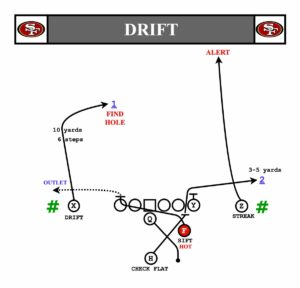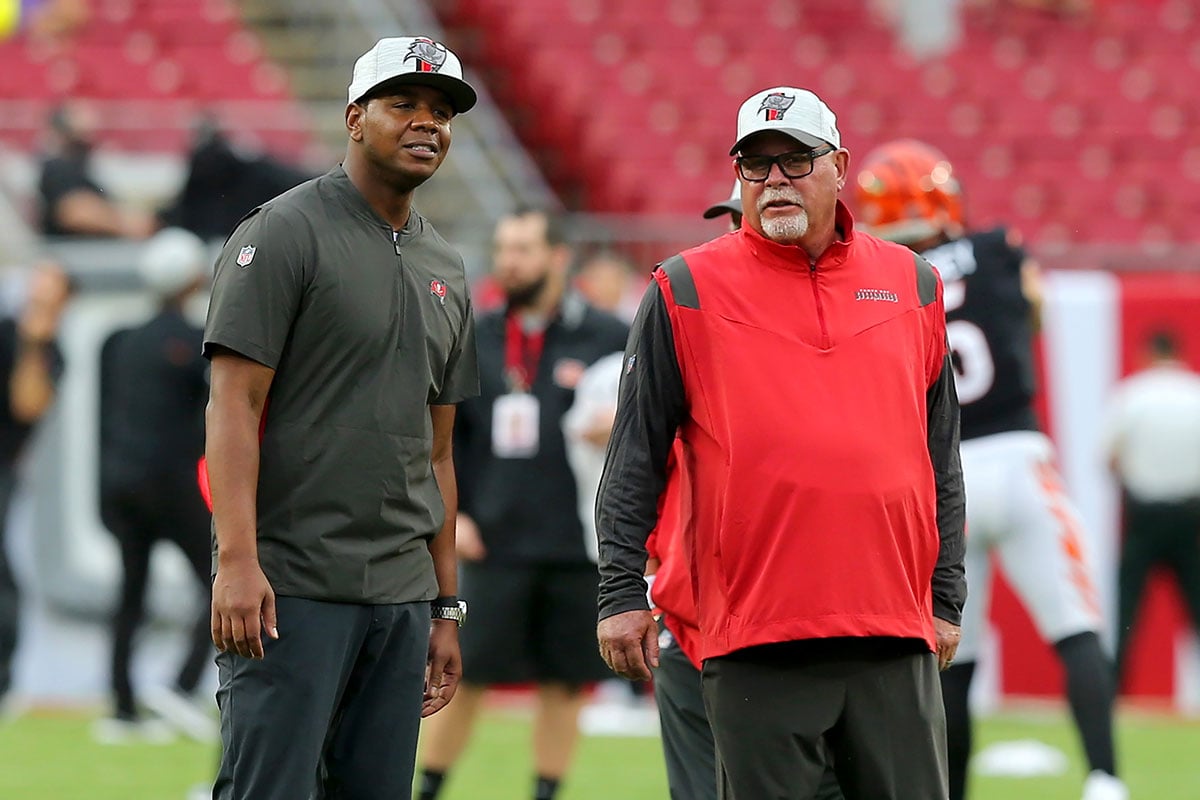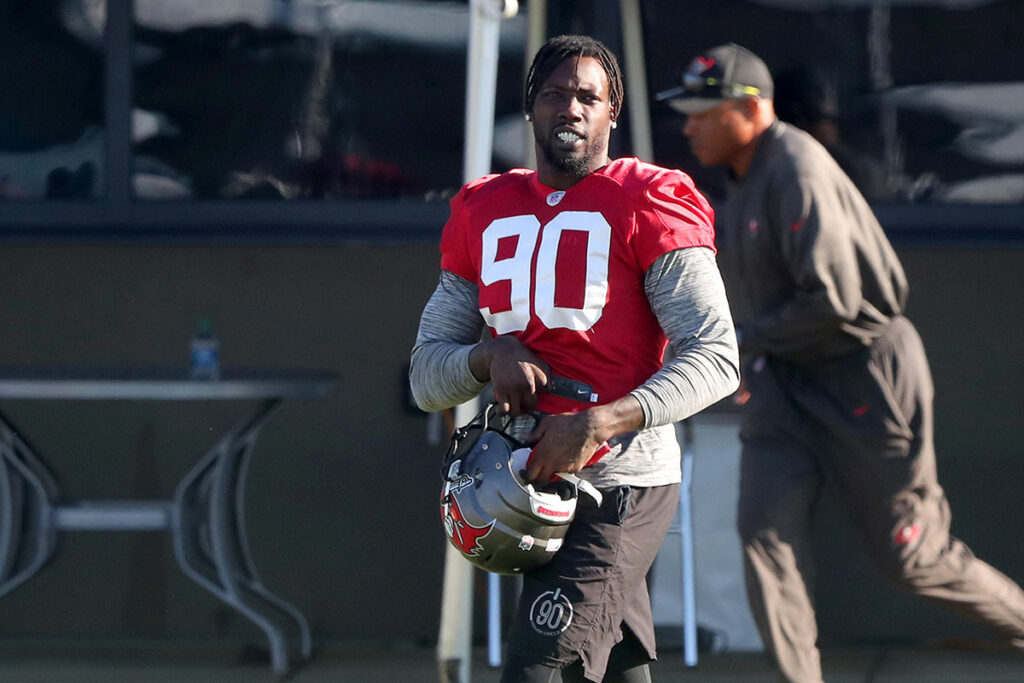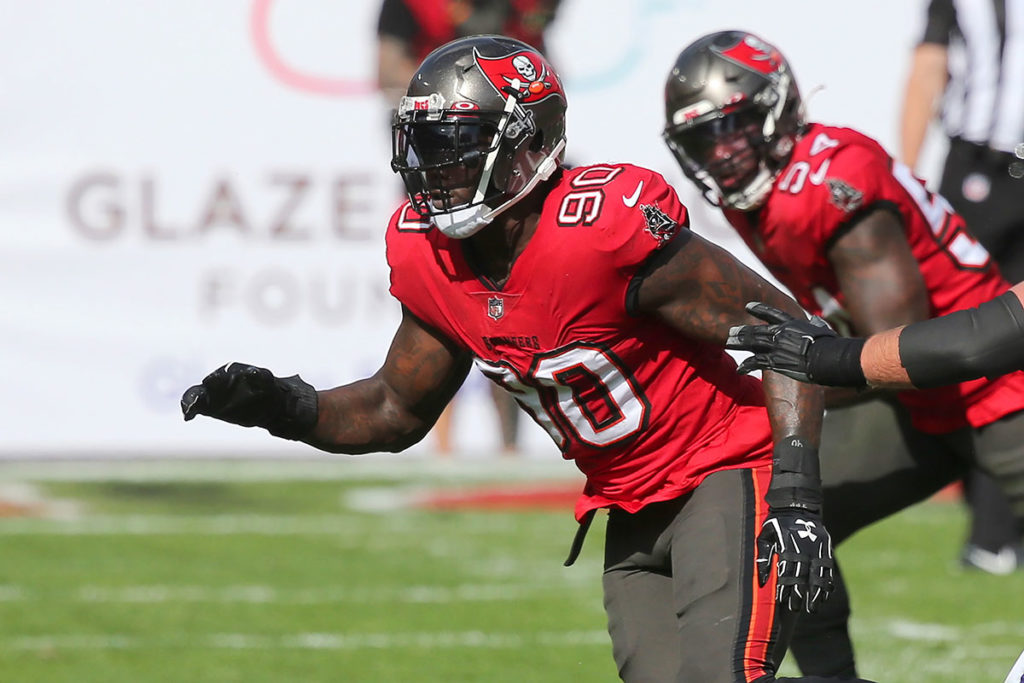A good offense is like a good wardrobe – anchored by strong staples with enough versatility to handle any type of conditions. It should also evolve. Your good winter coats are your good winter coats, but a new scarf can go a long way. Last year’s team had all the pieces. But, to continue this drawn-out sartorial metaphor, it was like the Bucs had a closet full of Dolce & Gabbana suits with no tailor. Well, everything has fit a lot better in 2021.
Some of the changes happened after last season’s bye week, like when the Buccaneers went from using play action on 19 percent of their passes to 26 percent. Their pre-snap motion rate changed, too, spiking from 46 percent to 59 percent. These changes were clearly intentional, no matter how much Byron Leftwich tries to gaslight us into thinking otherwise. What’s most encouraging are the continuous tweaks. Not overhauls. Just subtle adjustments that give this offense more answers.
— All-22 Clips (@HossYJuke) September 23, 2021
In Week 1, with Chris Godwin in motion, Dallas cornerback Jourdan Lewis was unable to press at the line of scrimmage. Godwin released freely, ran a clean route, and scored.
One example of this adaptability has been how Tampa Bay has manipulated personnel to exploit its opponents. Against the Dallas defense, orchestrated by Dan Quinn and his unremitting use of single-high coverages, Tampa Bay emphasized having speed on the field by playing 11 personnel (one running back, one tight end, and three wide receivers) on 64 percent of their offensive snaps. Furthermore, the Bucs were only under center for 31 percent of their snaps.
The Bucs looked dramatically different against the Falcons when defensive coordinator Dean Pees used two-safety coverages on 59 percent of Tampa Bay’s offensive plays. To counter Atlanta’s lighter boxes, the Bucs went under center on 62 percent of their snaps and dropped their 11 personnel usage to 46 percent. Having another tight end on the field made the threat of the run imminent, and Leftwich took advantage by dialing up playing action on 35 percent of the Bucs’ passes.
This is awesome.
2 minutes remaining in the first half. Bucs come out in 13 personnel and run four verticals off of play action.
Brady and Howard connect on the bender against the Falcons’ cover 2.
Leftwich has been feelin’ it this season! pic.twitter.com/MIWU7MZ3SC
— Paul Atwal (@AtwalNFL) September 21, 2021
From a design standpoint, Bruce Arians’ offenses have always placed a particular emphasis on core concepts. Arians and Leftwich aren’t up all night crafting the perfect designer or gadget play that they’ll use once in the entire season for a gain of 13 yards. Instead, they ask the quarterback to find answers within their existing concepts.
However, even some core concepts have seen tweaks. One example of this is how the Bucs ran Smash last Sunday. As I’ve written about before, the Bucs prefer to use their Okie and Smurf concepts over the typical hitch and corner combination. Against the Falcons, Tampa Bay ran a variation where Antonio Brown lined up out wide (instead of a tight split, as he would for Okie or Smurf) and ran a pivot route underneath Chris Godwin’s corner route. Although Brown lost his balance and the ball went to Godwin, this was good process. Brown is one of the league’s sharpest route runners. Letting him use that agility is in the Bucs’ best interests.
Brady on the next drive (Thanos voice): "fine, i'll do it myself" pic.twitter.com/jGdqivKRID
— Jon Ledyard (@LedyardNFLDraft) September 22, 2021
The Bucs even ran their counter to Okie, which the Bucs used surprisingly little last season.
Okie counter at the bottom. Brady reads Evans instead because it’s a good match up and there’s (in theory) a post safety.
He either whiffed the throw or wanted to hit it back shoulder. pic.twitter.com/oiSHu8lZul
— All-22 Clips (@HossYJuke) September 23, 2021
Arians and Leftwich also poached Sean McVay’s Strike concept (known as Drift under Kyle Shanahan). Strike lets the receiver find space against zones as opposed to running to landmarks.
— All-22 Clips (@HossYJuke) September 23, 2021

Tom Brady’s arsenal has apparently expanded, too, as he’s thrown two designed bootleg passes through two games. Over 20 games last season, Brady only had six designed roll-outs.
— All-22 Clips (@HossYJuke) September 23, 2021
— All-22 Clips (@HossYJuke) September 23, 2021
My biggest concern for the Bucs’ offense was, and still is, how they play against middle of the field open coverages. They haven’t been tested by a top defense yet, but there have been positive signs.
— All-22 Clips (@HossYJuke) September 23, 2021
The Bucs used a Spacing concept to beat the Falcons’ Cover 2 zone on 3rd down. Godwin shuffled and found space between the linebackers.
Patient, underneath, play calls are a necessary part of the game plan to beat middle of the field open coverages. This offense hasn’t been perfect, of course. In fact, their actual efficiency metrics are well behind where they should be. As PFF’s Timo Riske explained, the Bucs have consistently moved the ball, but turnovers and a few high-leverage situations (e.g. drops on 3rd down) have hindered their EPA/play over a small sample size. The good news is that there’s no way the Bucs finish the season as the 19th most efficient offense.
Arians and Leftwich’s offense is showing signs of growth and refinement. They’re continuing to be aggressive, but with intricacies that weren’t possible last year with a new quarterback and a truncated offseason. The signs have been good, but it still has been only two games.
The biggest test to this offense’s adaptability will come Sunday. That’s when the Bucs take on Jalen Ramsey, Aaron Donald, and the Rams.




